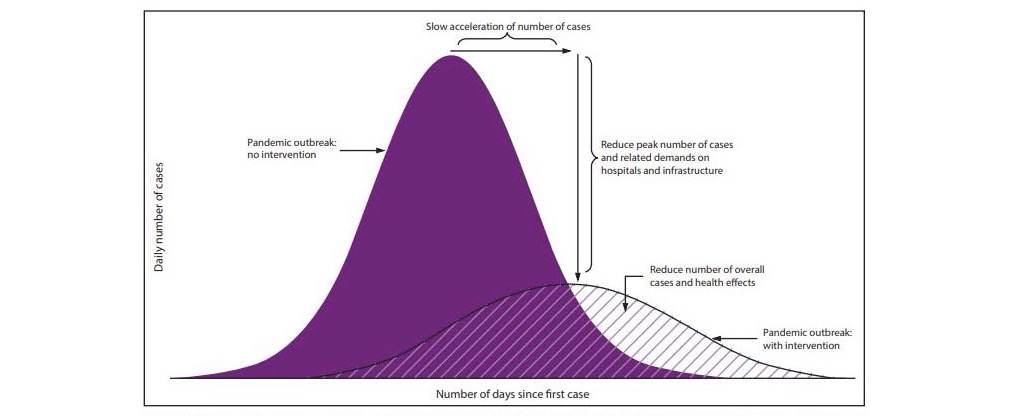Thought Leadership Corner: Covid-19 - Time to flatten that curve
Coronavirus is still sweeping across the world. It’s in more than 150 countries, there are more than 170,000 confirmed cases and far too many deaths – just over 6,500 at the time this was written (16 March 2020). It’s worth noting that more than 77,000 people have recovered, too.
Efforts to contain the spread are at the forefront of national government strategies. One of the top priorities is to prevent a large number of people all getting seriously ill at the same time and overwhelming healthcare services. This is often referred to as flattening the curve.
To anyone in retail, ecommerce and logistics it may feel familiar.

Black is black
Cast your mind back to the first really big Black Friday the UK experienced. It was a chaotic experience. Millions of orders were forced through warehouses, distribution centres and delivery operations. Many systems simply couldn’t cope, and parcels sat in trailers and containers for weeks while the backlog of orders was slowly cleared.
Subsequent years have seen retailers start their Black Friday promotions at least a week ahead of the actual day, in an attempt to avoid such problems. It’s an attempt at flattening the curve – easing the burden, spreading the load.
Part of that strategy has also involved looking beyond normal routes and networks for distribution. Over the last five years, the UK has seen significant growth in the use of click and collect services, alternative delivery locations, and to a lesser extent parcel lockers.
Whether we’re talking about the pressure on medical services during a health crisis or on delivery networks during the end-of-year peak, the problem is caused by a rapid increase in demand. In the current Covid-19 outbreak, there will also be supply-side challenges.
World in motion
Supply chains are now very much a global affair. It is taken for granted by many businesses in Europe and North America that the products they design will be manufactured in China or Vietnam. Much of the food we eat is shipped in from thousands of miles away – green beans from Kenya, oranges from Spain, avocados from Mexico.
Covid-19 is having many well-publicised adverse effects on normal daily life. Supply chains are feeling some of those effects, too. The more dispersed and complex a global supply chain is, the greater the number of possible weak spots it will contain. Contingency plans involving alternative sources of important items could be one way to avoid the worst consequences of supply chain disruption. A UK food retailer buying potatoes from Cyprus may look for UK growers to fill potential gaps, for example.
The same is true for delivery networks. They too can be dispersed, complex and prone to disruption. At a time when some people are already voluntarily self-isolating, some are limiting their exposure to other people, and all of us are waiting to see what might happen next, if you’re not ready to be flexible you’re simply not ready at all.
If, as is expected, schools across the UK are closed there will be a significant ripple effect felt in businesses all over the country – people might not be able to go into work if they have young children suddenly not in school. This could cause a drop in overall productivity, a decline in what’s achievable and a departure from levels of service we have all grown accustomed to.
Stand and deliver
We may be entering a phase where everyone has to be more patient, more understanding and more flexible. If one-in-10 delivery drivers are unable to work, there will be problems fulfilling home-deliveries. If that number rises, along with similar numbers in distribution centres, things could start to feel impossible pretty quickly.
That doesn’t mean it’s going to be ok to fail to meet customer expectations. Far from it. It means recalibrating those expectations and being more determined than ever to keep customers fully informed of the levels of service you can realistically commit to.
Whatever the next few weeks and months through at us, it’s worth remembering that we are all in this together. We can get through it together, too. But only if we are all prepared to adjust our view of what we expect from the people and businesses around us and help one another out.
Parcelly adds: “The pandemic caused by COVID-19 has not only affected the health of thousands of people, but it is also creating unprecedented obstacles for global and local supply chains. With customers avoiding public spaces and purchases in-store, many opt to shop online and get their parcels delivered at home, posing more challenges to urban logistics. In view of growing supply chain pressures, with consistently high consumer demands, the need for Hyper-Local Fulfilment solutions, smart distribution models and innovative last- and first-mile delivery options has been lifted to a whole new level.
By turning excess space in local shops and businesses into parcel storage capacity, Parcelly created a nationwide sharing economy platform with a technology that can be integrated into any retail or logistic company's supply chain fulfilment process. Our dynamic network of PUDO locations is an enabler for hyper-local delivery solutions, accessible to all players in the market to store, consolidate, cross-dock and to fulfil items. By supporting a last-mile infrastructure that utilises excess space and helps to reduce the distance between storage location and final customer, our innovative PUDO model drives sustainable on-demand delivery options and caters to growing customer requests for convenience and instant delivery."
This website and its content is copyright of Parcelly - © Parcelly Ltd. 2020. All rights reserved. You may not, except with our express written permission, distribute or commercially exploit the content. Nor may you transmit it or store it in any other website or other form of electronic retrieval system.

